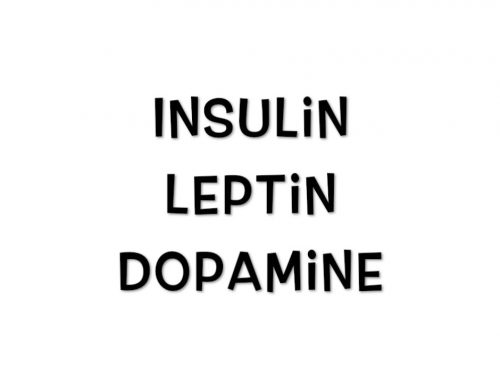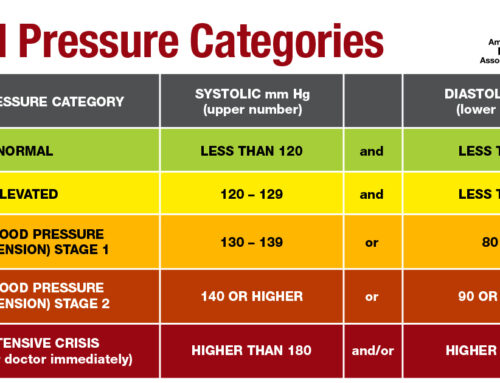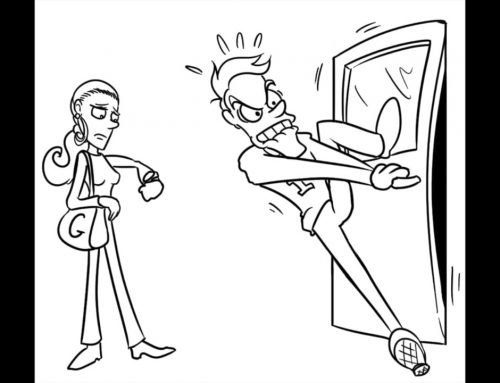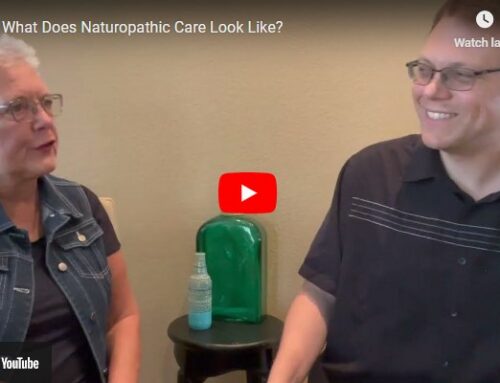Watch Part 2: Empower Yourself with Proactive Self-Care
Watch Part 3: What Does Naturopathic Care Look Like?
Transcript:
Today we’re going to be talking about integrative medicine–what it is, how it can help us, who it’s for. And we have Dr. Tina Marcantel (NMD) here with us.
Hi!
So when we talk about “integrative medicine,” what are we integrating?
So, when we talk about integrative medicine, we talk about what’s called “naturopathic” medicine and more of a conventional medicine. And what we do is we combine them for the highest good of the individual–of the patient at hand.
So let’s talk about our terms here. When we say “naturopathic medicine,” what does that mean–naturopathic medicine?
Naturopathic medicine is one of–the philosophy is to get to the root cause of the problem instead of just band-aiding the symptoms–get to the root cause of a problem, do a lot of teaching with the individual so that they will be empowered to take care of themselves and to be proactive with their health. That’s a big one, right there.
And the other thing is “holistic.” We look at the whole person. We look, of course, at the body, the mind the emotions, spiritual–all of that contributes to the well-being of an individual.
So when we look at conventional medicine, we look at more of–the visits are shorter, there’s more medication that’s usually prescribed. I, myself, am not against medication, I prescribe it myself, but I also like to get to the root cause. So I like to combine the best of both worlds for the good of the individual.
So, can we talk more about conventional medicine and what exactly that means in this context?
Conventional medicine is what we’re more familiar with. It’s what we were brought up in. You go to a doctor, whether it be a family physician, a specialist, and there are tests that are done, and you’re given a diagnosis, and a lot of times you’re given medication for it.
So it’s treating mostly the symptoms without getting to the root cause. Now, sometimes there are circumstances where they do–they run tests and all to get at the root cause of the problem. But, it is–the visits are short-term and there’s only so much that the doctor can do.
Do you feel like there is a conflict between the two sides of this integration–conventional medicine and naturopathic wisdom?
Well, it depends on who you’re talking to. For me, no. Not at all. Because my background is one where I worked as a registered nurse in the hospital, in the clinics, for twenty-plus years, and then I became a naturopathic physician. So I look at the best of both worlds. Now, sometimes there’s a–let’s put it this way–a misunderstanding, maybe, between physicians of the naturopathic world and the conventional medicine world. And that’s why communication between the doctors is so important. And that’s why I like to get together with–if my patient is seeing a physician–a neurologist, endocrinologist–I like to get together and communicate about the individual and add my special sauce–my special education and information and ideas that I have for their plan of care. And when we can work together, when the person needs both medication and but also looking at their meal plans and their stress levels, and all that other stuff, that is what is going to truly help the individual.
So what is one of the major misunderstandings that there seems to be between these two schools of thought?
Well, the misunderstanding comes from not having the knowledge of what the other does for the greater good of the patient.
Maybe the naturopath may have a wrong perception of the doctors giving too many medications, why aren’t they trying to get to the root cause, and the conventional doctor is saying, “Why don’t they take more medication, and what is this about nutrition, is it really going to help?”
You know, we need to educate one another so that we can come together in a place of unity, once again, for the good of the individual patient–client.
So what kind of knowledge do you think that the patient should possess as they’re thinking about their different types of care options?
The first thing, of course, is they have to consider what do they need? What are their goals for the individual physical ailment or disease or situation? More and more patients are becoming more and more empowered because of the Internet. Now, the Internet doesn’t have all the answers, and sometimes there’s too much read. But they are educating themselves more and they’re becoming more and more proactive. So with some of that knowledge from both conventional and naturopathic information out there, they can start asking themselves the questions of “What, specifically, do I need for my care? And, where will I go and what are the questions I’ll have for that individual doctor?” And a lot of patients that I see will always consider this: they will ask their conventional medicine doc if he or she will work with me as a naturopath and I, in turn, will ask the conventional medicine doc if we could share, either through phone or fax or whatever, the information that’s going on–the treatment that’s being given, you know, especially with cancer patients. We need to know what the other one is doing. And we kind of missed that when I worked in conventional medicine. There were getting to be more and more specialists–which is awesome, which is great–but there was a lack of communication about what the specific specialty is doing for the patient. And then we get too many medications with too many side effects.
So when a patient comes to me I usually look at all the medications they’re on. And the supplements that there may be interactions with those. And sometimes they’re taking the same thing, doubled or even triple of the same thing. So we’re kind of the ones that go through it, and it does take some time. But, yes, both worlds need to look at what’s going on.





